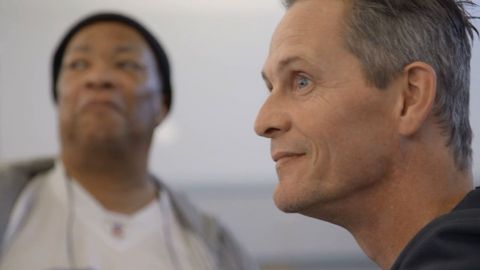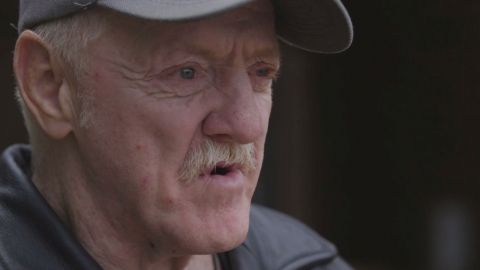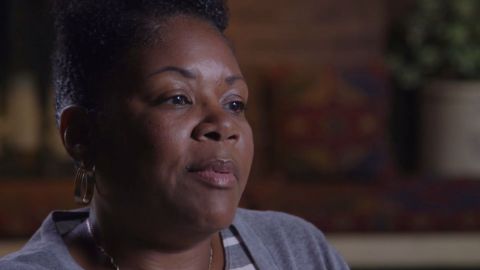AMNA NAWAZ: In Nashville, there's an unusual program that helps women in recovery make
a new start in life.
As John Yang tells us, it's powered by a sense of sisterhood and a boutique line of home
and body products.
This story is part of our look at poverty and economic opportunity, Chasing the Dream.
JOHN YANG: It's the morning rush at Thistle Farms in Nashville, Tennessee.
The cafe is open for breakfast, while the adjoining shop sells hand-crafted home and
body products made across the street.
But, first, workers gather in a circle for a moment of reflection.
WOMAN: Good morning.
I'm Jennifer.
I'm on the development team.
I'm a 2012 graduate.
WOMAN: Good morning.
I'm Kristin, 2015 graduate.
JOHN YANG: Thistle Farms is no ordinary business.
It's a nonprofit staffed by women who have battled addiction, sexual abuse or trafficking.
WOMAN: Come next month, I will have five years clean, yes.
(CHEERING AND APPLAUSE)
JOHN YANG: For these women, Thistle Farms is more than just a paycheck.
It's a lifeline.
WOMAN: The love, the compassion that I was shown.
JOHN YANG: Kimberly Simkins works on the production line.
Two years ago, she was in the throes of addiction.
KIMBERLY SIMKINS, Thistle Farms Employee: It was either, I was going to make a commitment
and get this right and really try to rebuild and reshape my life in the path that it was
on, or I was going to give up and die in addiction.
JOHN YANG: Thistle Farms' two-year program provides group housing and access to free
therapy and medical care.
Shamika Simpson, who works on the logistics team, is about to graduate.
SHAMIKA SIMPSON, Thistle Farms Employee: I got so used to living life in addiction and
like with my eyes wide shut, just living life every day, but you're not seeing anything.
And I lose -- I lost touch of everything.
I lost my kids.
You know, they were taken by the state, and then dysfunctionality just became a way of
life.
JOHN YANG: She says not having financial worries allowed her to focus on her recovery.
SHAMIKA SIMPSON: What they taught me was, during these two years, I don't want you to
worry about how you're going to pay your rent.
I don't want you to worry about how you're going to buy groceries.
What I want you to worry about is how you're going to heal yourself.
JOHN YANG: Episcopal priest Becca Stevens started the program 22 years ago, driven,
she says, by her own history of being sexually abused as a child.
REV.
BECCA STEVENS, Founder, Thistle Farms: It was awful.
It was scary, but also there's some gifts in it about how you read the world.
I can use it for the good, I can transform it, I can do all kinds of stuff, but I don't
have to get over it.
JOHN YANG: At first, it was just a single home providing shelter and a safe place to
recover.
REV.
BECCA STEVENS: Five women came in, all with criminal histories of trafficking, prostitution,
and addiction.
And everybody stayed.
Nobody left.
JOHN YANG: The business came later.
REV.
BECCA STEVENS: Four years into it, we're like, we cannot talk about that we love women if
we're not concerned about their economic well-being.
Nobody would hire them.
They had no work experience.
They knew how to hustle.
And that's when we thought, we will just start our own company and make something beautiful
for people's bodies.
JOHN YANG: Thistle Farms aims to do well by doing good.
In the last fiscal year, product and cafe sales topped $4 million.
That accounts for about 70 percent of the total operating budget.
In 2017, Thistle Farms CEO Hal Cato led a $3 million expansion.
HAL CATO, CEO, Thistle Farms: There are a lot of businesses that have a mission.
We're a mission with a business.
We're not here to make candles, you know?
That's not what we get up every day.
We get up every day to make candles because we know the sale of that candle is going to
help the next woman come in and be a part of this community.
JOHN YANG: Bill and Evie Harman sell Thistle Farms products at their store in Lynden, Washington.
They came to Nashville for a first-hand look.
EVIE HARMAN, Thistle Farms Vendor: We recognize that women especially have a hard time finding
a place where they can thrive.
We have so much to learn about how -- how can we make this world work for these women
who aren't thriving?
And Becca has figured out how to do it.
JOHN YANG: Cafe manager Angela Camarda didn't go through the program, but she has her own
history of drug addiction and time in federal prison.
When she applied for a job at Thistle Farms, she found a welcoming environment.
ANGELA CAMARDA, Thistle Farms Employee: My boss told me whenever she interviewed me that
it didn't matter what my past was.
That has nothing to do with this job.
Tell me what you're doing now.
Tell me what you're doing for your recovery now and how you take care of yourself.
JOHN YANG: Women in the program say the most powerful thing it provides is a feeling of
sisterhood.
KIMBERLY SIMKINS: Even before my addiction, I was always searching for something.
And when my sister from Chicago came to my graduation, she, like, looks at me and tears
running down her face.
She's like: "You have finally found your people."
I said: "Yes.
Yes, I did."
JOHN YANG: From a single residence, Thistle Farms has grown to five homes in Nashville,
but the demand is still far greater.
REV.
BECCA STEVENS: Honestly, some of the women die waiting to get in this program.
There's over 100 women on the waiting list.
It says that the demand is far exceeding our resources.
JOHN YANG: Thistle Farms now has more than 50 affiliated groups across the country, and
30 more partners around the world, from Rwanda to Ecuador and Cambodia.
REV.
BECCA STEVENS: It's never going to be the woman just comes off the streets by herself,
because she didn't get out there by herself.
It took a whole community of brokenness to get her out there.
So why can't there be this whole beautiful community welcoming her home?
JOHN YANG: And women about to graduate from Thistle Farms are looking toward the future.
Kimberly Simkins plans to pursue a degree in clinical social work.
KIMBERLY SIMKINS: I would like to think that I am some sort of mentor, that the things
that I experienced in the program and have been through, and was able to push through
all of those challenges and complete the program, that it's going to give motivation to somebody
else, like, hey, she did it.
Maybe I can too.
JOHN YANG: Shamika Simpson's future includes her children, who were returned to her last
year.
SHAMIKA SIMPSON: It's taught me how to love myself, taught me how to be a mother again.
All my kids are back now.
So, doors that I thought were shut forever have opened back up.
JOHN YANG: Opened with the power of sisterhood and the support of the community.
For the "PBS NewsHour," I'm John Yang in Nashville, Tennessee.



